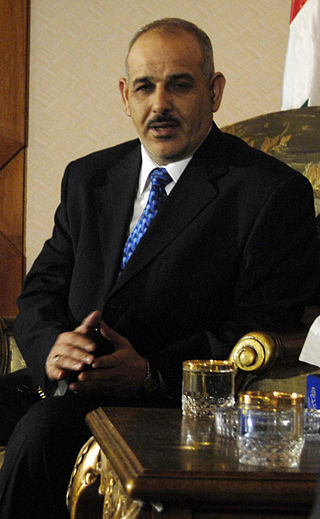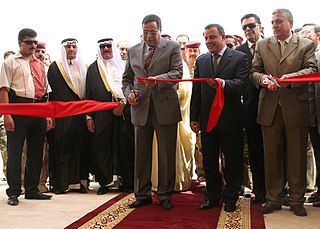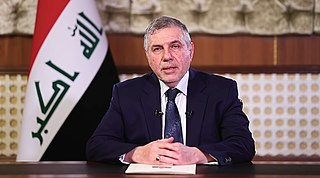Related Research Articles
Iraq is a federal parliamentary representative democratic republic. It is a multi-party system whereby the executive power is exercised by the Prime Minister of the Council of Ministers as the head of government, the President of Iraq as the head of state, and legislative power is vested in the Council of Representatives.

Tariq Aziz was an Iraqi politician who served as Deputy Prime Minister (1979–2003), Minister of Foreign Affairs (1983–1991) and a close advisor of President Saddam Hussein. Their association began in the 1950s when both were activists for the then-banned Arab Socialist Ba'ath Party. He was both an Arab nationalist and a member of the Chaldean Catholic Church.

The prime minister of the Republic of Iraq is the head of government of Iraq and the commander-in-chief of the Iraqi Armed Forces. On 27 October 2022, Mohammed Shia' Al Sudani became the incumbent prime minister.

Haider Jawad Kadhim al-Abadi is an Iraqi politician who was Prime Minister of Iraq from September 2014 until October 2018. Previously he served as Minister of Communication from 2003 to 2004, in the first government after Saddam Hussein was deposed.

Kuwait Oil Company (KOC), an oil company headquartered in Al Ahmadi, Kuwait, is a subsidiary of the Kuwait Petroleum Corporation, a government-owned holding company. Kuwait was the world's 10th largest petroleum and other liquids producer in 2010. The company produced a total of 1.7 million barrels per day.
The first government of Iraq led by Prime Minister Nouri al-Maliki took office on May 20, 2006 following approval by the members of the Iraqi National Assembly. This followed the general election in December 2005. The government succeeded the Iraqi Transitional Government which had continued in office in a caretaker capacity until the new government was formed and confirmed.

Nouri Kamil Muhammad-Hasan al-Maliki, also known as Jawad al-Maliki, is an Iraqi politician and leader of the Islamic Dawa Party since 2007. He served as the Prime Minister of Iraq from 2006 to 2014 and as Vice President from 2014 to 2015 and again from 2016 to 2018.
Abdel Falah Hassan Hamadi al-Sudani is an Iraqi politician who was the Minister of Trade from May 2006 to May 2009 in the government of Nouri al-Maliki. He previously served as Education Minister in the Iraqi Transitional Government from May 2005 to May 2006.

Jawad al-Bulani served as the Interior Minister of Iraq within the Council of Ministers under Iraqi Prime Minister Nouri al-Maliki from 8 June 2006 to 21 December 2010. Bulani is a Shi'a independent member of the United Iraqi Alliance.

Iraq, officially the Republic of Iraq, is a country in West Asia and a core country in the geopolitical region known as the Middle East. With a population of over 46 million, it is the 35th-most populous country. A federal parliamentary republic, it consists of 18 governorates. Iraq is bordered by Turkey to the north, Saudi Arabia to the south, Iran to the east, the Persian Gulf and Kuwait to the southeast, Jordan to the southwest, and Syria to the west. The capital and largest city is Baghdad. Iraqi people are diverse; mostly Arabs, as well as Kurds, Turkmen, Yazidis, Assyrians, Armenians, Mandaeans, Persians and Shabakis with similarly diverse geography and wildlife. Most Iraqis are Muslims – minority faiths include Christianity, Yazidism, Zoroastrianism, Mandaeism, Yarsanism and Judaism. The official languages of Iraq are Arabic and Kurdish; others also recognized in specific regions are Turkish, Suret, and Armenian.

The Ministry of Defence is the cabinet-level ministry responsible for defence in Iraq. It is also involved with internal security.

Iraq's electricity generation primarily depends on fossil fuels. In 2021, natural gas was the largest source at 57.3% of the total, followed by oil at 36.7%. Renewable energy, mainly from hydroelectric power, contributed 5.9%. As of 2023, the 30 gigawatts (GW) of installed capacity cannot meet summer peak demand.

Qasim Mohammad Abid Hammadi al-Fahadawi is an Iraqi politician and businessman who is the current Minister of Electricity in the Al Abadi Government, and who previously served as the Governor of Anbar from April 2009 to August 2013.

Mohammed Tawfik Allawi is an Iraqi politician who was the Iraqi Prime Minister-designate in 2020, and twice Minister of Communications in the Al Maliki government from May 2006 until August 2008 and from 2010 to 2012. Both times he resigned from his position in protest against al-Maliki's sectarian agenda and political interference. He was nominated to serve as Prime Minister of Iraq in February 2020, but withdrew his nomination after Parliament failed to reach a quorum.
The second Al-Maliki government was the government of Iraq from 22 December 2010 to 8 September 2014. This followed a record length of time since the Iraqi parliamentary election, 2010 which resulted in Prime Minister Nouri al-Maliki retaining his position and forming a national unity government including all main blocs that had been elected to parliament.

The 2011 Iraqi protests came in the wake of the Tunisian revolution and 2011 Egyptian revolution. They resulted in at least 45 deaths, including at least 29 on 25 February 2011, the "Day of Rage".

Corruption is pervasive at all levels of government in Iraq. In 2021, President Barham Salih stated that US$150 billion of oil money had been stolen and smuggled out of Iraq in corrupt deals since the 2003 U.S. invasion. Endemic corruption pervades Iraq's oil and gas sectors, which still accounts for more than 99 percent of the country’s exports and 85 percent of the government’s budget. The Iraqi economy is predominantly a cash economy, making it almost impossible to trace the amount or the path the money follows.

The departure of US troops from Iraq in 2011 ended the period of occupation that had begun with the U.S.-led invasion in March 2003. The time since U.S. withdrawal has been marked by a renewed Iraqi insurgency and by a spillover of the Syrian civil war into Iraq. By 2013, the insurgency escalated into a renewed war, the central government of Iraq being opposed by ISIL and various factions, primarily radical Sunni forces during the early phase of the conflict. The war ended in 2017 with an Iraqi government and allied victory, however ISIL continues a low-intensity insurgency in remote parts of the country.

Dr. Luay al-Khatteeb is an Iraqi independent politician who was the former Electricity Minister and member of the Federal Energy Council in the Government of Adil Abdul-Mahdi. Prior to this, he was the founding director of the Iraq Energy Institute, a think tank producing scholarship and analysis on current, historic and future energy, economy and technology trends in Iraq, as well as organizing high-level fora on energy reform in Iraq and the region.

As sequel to protests in 2011, 2012 and 2013, Iraqi citizens have also in 2015 up until 2018 often and massively protested against the corruption and incompetence in their government which according to analysts and protesters had led to long-running problems in electricity supplies, clean water availability, Iranian interference in Iraqi politics, high unemployment, and a stagnant economy.
References
- ↑ Maliki fills power, trade, other Iraq cabinet jobs, Reuters, 13 February 2011, accessed 1 January 2012
- 1 2 Kenneth Katzman, Iraq: Politics, Governance, and Human Rights, Congressional Research Service, 9 August 2011
- ↑ Al-Maliki gives Iraqi officials 100 days to improve – or else, Associated Press, 27 February 2011
- ↑ Iraq buys 50 diesel plants to ease power shortages, Reuters, 23 March 2011
- ↑ Choi He-suk, STX Heavy signs W3tr Iraq power plant deal, The Korea Herald , 19 May 2011
- ↑ PM Maliki, his Deputy Shahristany, charged by al-Iraqiya Coalition with signatures on electricity contracts, Aswat al-Iraq, 8 September 2011
- ↑ Iraq police arrest ex-electricity minister, Agence France-Presse, 30 September 2011
- ↑ Haider Ibrahim, Former Electricity Minister Shallal released on vow to testify, AK News, 29 September 2011